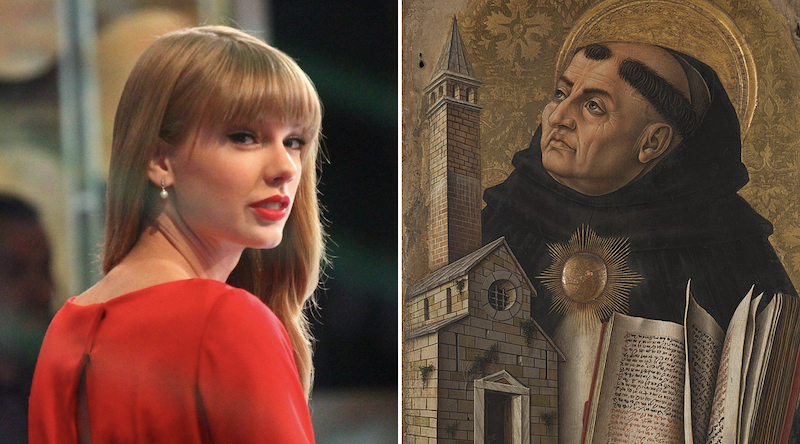Taylor Swift might seem an unlikely commentator on the works of Saint Thomas Aquinas, particularly his teaching on divine mercy. But a commentator she nonetheless is, albeit unintentionally and at times inconsistently.
Ms. Swift’s commentary lies in the tension between two hit songs, “Karma” and “Anti-Hero,” from her most recent studio album, Midnights.
The former—a song of the break-up variety—cries out for revenge, albeit not to God but to karma. “Karma is my boyfriend; karma is a god; karma is the breeze in my hair on the weekend; karma’s a relaxing thought; aren’t you envious that for you it’s not?”
In the music video, after two verses of mounting accusations and an assertive bridge passage, the screen cuts to an old interview with Swift, where a voice behind the camera asks, “What do you think is the most important life lesson for someone to learn?” Smiling confidently, she replies, “That karma is real.”
According to “Karma,” the answer to our sorrows and sufferings is an impersonal cosmic force—ultimately, a vague projection of our own hunger for vindication and vengeance. When comforting the afflicted, karma combines the adolescent love of a boyfriend, the angry might of a deity, the pleasure of a weekend breeze, the diversion of a relaxing thought. But to those who cross her, “karma is the thunder rattling your ground, on your scent like a bounty hunter, gonna track you down, step by step from town to town, sweet like justice.” The pre-chorus line thus summarizes Swift’s commentary: “And I keep my side of the street clean. You wouldn’t know what I mean.”
To the Christian, such a tirade is surely intelligible: we have all been burnt—some in severe or life-altering ways—and we have all desired retribution. But such a tirade is also unacceptable, for we have all been forgiven. No one’s side of the street is clean, unless washed in the blood of the spotless Lamb. Cleansed by that blood, we love—we forgive—because he first loved us (1 John 4:19). In the end, retribution belongs not to the whims of karma but to the steady hand of Providence, who justly rewards our deeds and draws us in and through our sufferings unto perfect love.
Ms. Swift’s ode to karma stands in stark contrast to the album’s hit single, “Anti-Hero.” In an Instagram video, Swift calls “Anti-Hero” “one of my favorite songs I’ve ever written” and “a real guided tour throughout all of the things I tend to hate about myself.” The refrain confesses over and again, “It’s me. Hi. I’m the problem. It’s me. At tea time, everybody agrees.” The shortcomings she shares would merit quite a visit from the karma she elsewhere extols: “When my depression works the graveyard shift, all of the people I’ve ghosted stand there in the room. I should not be left to my own devices. They come with prices and vices. I end up in crisis. Tale as old as time.”
If Swift plays the righteous Pharisee in “Karma,” she approximates the bent-over tax collector (Luke 18:9-14) in “Anti-Hero.” After all, is not each of us the actual problem—the one most capable of doing the most damage to ourselves?
Yet unlike the tax collector, Swift does not ask for mercy. Instead, the refrain exclaims: “I’ll stare directly at the sun but never in the mirror. It must be exhausting rooting for the anti-hero.” For all her awareness of her weaknesses and all her longing for help—for mercy—Swift despairs of doing what, in the end, we all must do: face the ugly truth about ourselves in the mirror, and then turn our gaze to the Eternal Son to behold ourselves in the full truth of his mercy.
Saint Thomas explains that mercy “maximally” belongs to God because it supremely expresses the gratuity of his eternal love. Mercy is thus the root of God’s every work, motivating everything he does toward us. We are owed neither existence nor redemption, yet in supplying both, God mercifully manifests his omnipotence: that, out of nothing, he can create us, and out of the misery of sin, he can raise us to the heights of heaven.
In the end, in what she says and sings and performs, Ms. Swift gestures, if confusedly, toward our radical need for divine mercy. For she is right that it really is exhausting rooting for the anti-hero. But God showed his love—his mercy—for us in the exhaustion and shame of the Cross. There, he conquered both our petty vindictiveness and pitiable self-loathing. In their place, divine mercy engenders the eternal peace for which Swift and every human heart longs. Thus the Risen Christ, bearing the glorified tokens of his Passion—the marks of his mercy—greets his fearful disciples in the Upper Room: Peace be with you (John 20:19, 21, 26). He does likewise to us, offering that same share in the triumph of his merciful love.
See also: “Is Tom Brady a Thomist?”
✠
Photo (Taylor Swift) by Paolo Villanueva (https://paolopv.com/)
Image (St. Thomas) by Carlo Crivelli, from Wikimedia Commons







